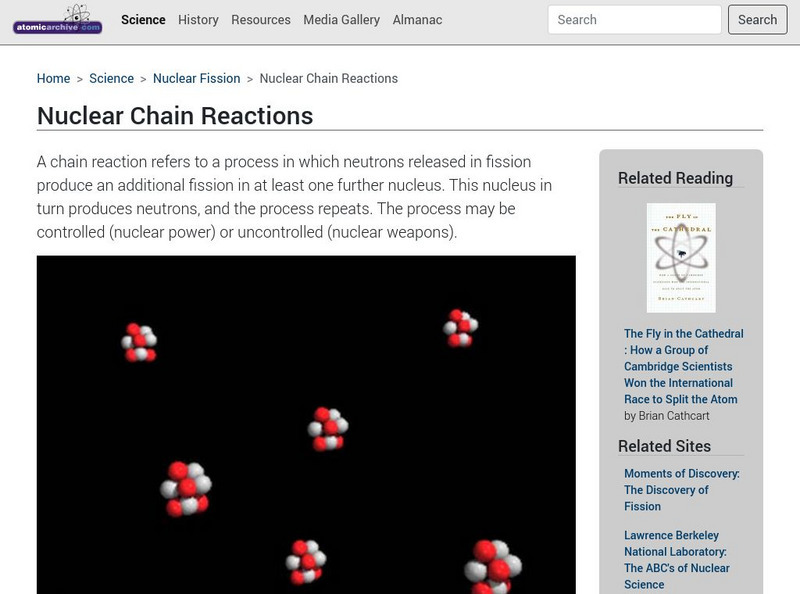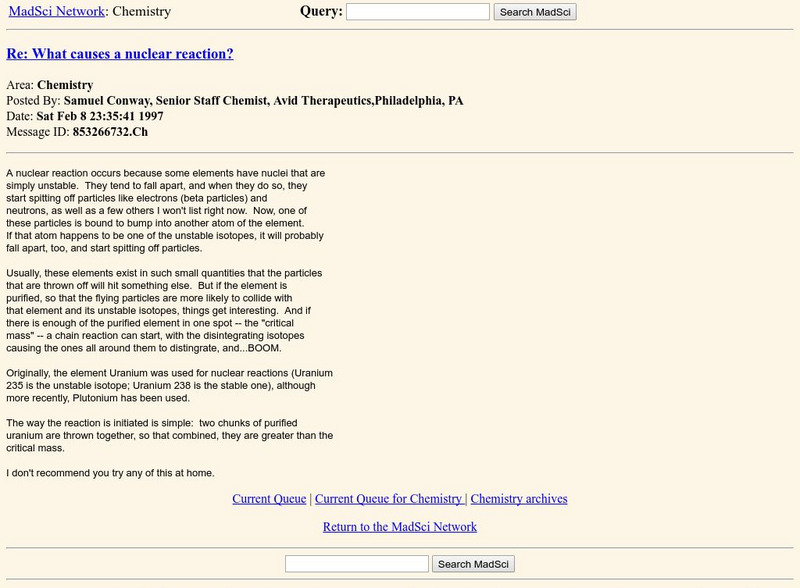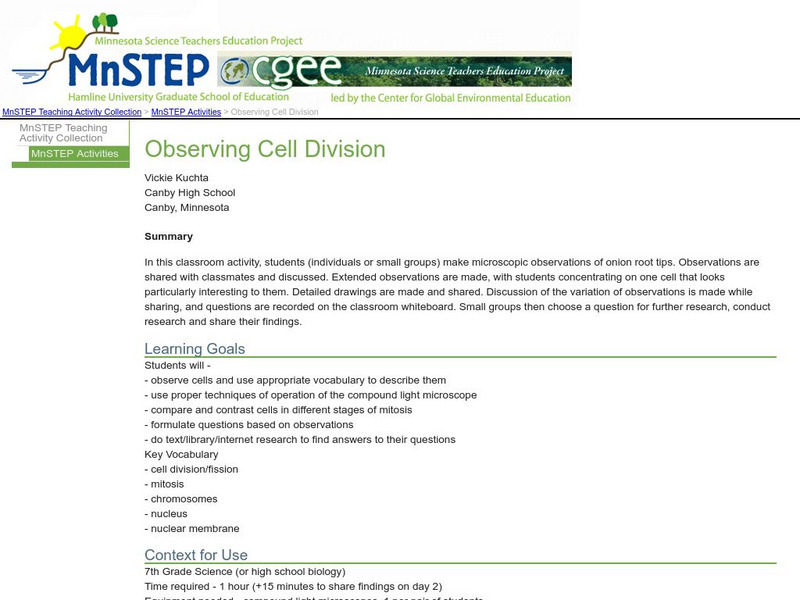Hi, what do you want to do?
CK-12 Foundation
Ck 12: Biology: Prokaryote Reproduction
[Free Registration/Login may be required to access all resource tools.] Discusses how prokaryotes reproduce.
CK-12 Foundation
Ck 12: Life Science: Bacteria Reproduction
[Free Registration/Login may be required to access all resource tools.] Bacteria, being single-celled prokaryotic organisms, do not have a male or female version. Bacteria reproduce asexually. In asexual reproduction, the "parent"...
CK-12 Foundation
Ck 12: Biology: Asexual vs. Sexual Reproduction
[Free Registration/Login may be required to access all resource tools.] A comparison of asexual and sexual reproduction.
Other
Society for General Microbiology: Bacteria
Bacteria are single celled microbes. The cell structure is simpler than that of other organisms as there is no nucleus or membrane bound organelles. Instead their control centre containing the genetic information is contained in a single...
Science Struck
Science Struck: How Does Radioactive Decay Work?
Explains the processes of radioactive decay in primary and secondary modes.
BiologyWise
Biology Wise: Organisms That Reproduce Asexually
Explains how asexual reproduction takes place and gives examples of organisms within different taxonomical kingdoms that reproduce in this way, as well as others that reproduce both asexually and sexually.
Australian Museum
Australian Museum: Dating the Earth
How do scientists know how old the Earth is? What is radioactive dating? Are there other dating methods? Get the answers to these questions and others at this site presented by the Australian Museum Online.
CK-12 Foundation
Ck 12: Biology: Cell Division and Cell Cycle Study Guide
This comprehensive study guide covers the main terms and concepts needed for a unit on cell division and the cell life cycle.
CK-12 Foundation
Ck 12: Life Science: 5.4 Bacteria Reproduction
Explore the different types of bacteria reproduction.
Atomic Archive
The Atomic Archive: Nuclear Chain Reactions
A couple of pages of text and graphics describing nuclear chain reactions. The means by which neutrons intiate and sustain a reaction is explained. A second page describes the complications associated with uncontrolled nuclear chain...
Bio Topics
Bio Topics: Cell Division and Chromosomes
An information sheet where students fill in the appropriate words to complete the page on cell division. Also included on page is diagrams of binary fission and cell division.
Ducksters
Ducksters: Biology for Kids: Cell Division and Cycle
A site about cell division and the cell cycle in the science of biology including mitosis, meiosis, and binary fission.
Oak Ridge National Laboratory
The Forties: War and Peace
Describes the design of the first nuclear reactor by Enrico Fermi and his successful development of a self-ustaining nuclear chain reaction. Describes the evolution of the Manhattan Project and their race to develop the first atomic...
Amethyst Galleries
Mineral Galleries/minerals Containg Zinc
Long list of mineral resources that contain zinc.
MadSci Network
Msn: What Happens in a Nuclear Reaction?
From The Mad Scientist Network web site. Using a question and answer format, this page discusses three types of nuclear reactions - spontaneous decay reactions, nuclear fision reactions, and nuclear fusion reactions. Each reaction type...
Georgia State University
Georgia State University: Hyper Physics: Relativistic Energy
A mathematically understandable presentation of relativistic energy. Parts include Relativistic Energy, Rest Mass Energy, Conservation of Energy, Pair Production, Relativistic Kinetic Energy, and even Kinetic Energy. A couple of...
Science Education Resource Center at Carleton College
Serc: Observing Cell Division
In this activity, young scholars make microscopic observations of onion root tips, discuss them with classmates, then make detailed drawings that are shared.
Famous Scientists
Famous Scientists: Harold Urey
Read about Harold Urey, the scientist who discovered deuterium, for which he was awarded the Nobel Prize in Chemistry. His work made a significant impact in an unusually wide range of scientific fields including cosmochemistry.
Famous Scientists
Famous Scientists: Lise Meitner
Learn about the life and scientific discoveries of Lise Meitner in this article.
Chemicool
Chemicool: Zinc
This site from the Chemicool Periodic Table provides an abundance of information on the element including everything from atomic number to abundance.
Web Elements
Web Elements Periodic Table: Zinc
This site from Mark Winter and Web Elements provides information on the element Zinc (Zn) and includes pictures and audio information about it.
Nobel Media AB
The Nobel Prize: James Chadwick Biographical
This sites provides a definitive biography of Chadwick presented by the Nobel (Prize) e-Museum.
eSchool Today
E School Today: Asexual Reproduction
Learn about different types of asexual reproduction.
Science Struck
Science Struck: Atomic Bomb Facts
Discusses lost nuclear weapons, the power of an atomic bomb, the bombing of Hiroshima and Nagasaki, the development of the atomic bomb, the making of the hydrogen bomb, the detonation of a hydrogen bomb by Russia in 1961, and the status...
Other popular searches
- Binary Fission
- Fission and Fusion
- Nuclear Fission
- Fission Fusion
- Nuclear Fusion and Fission
- Fission and Fusion Worksheet
- Mitosis Meiosis Fission
- Chemistry, Nuclear Fission
- Nuclear Fission Reactor
- Binary Fission Amoeba
- Nuclear Fission Fusion
- Chemistry Nuclear Fission




















